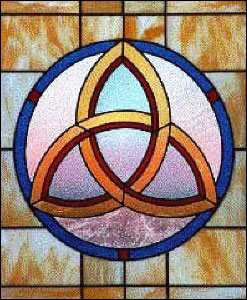This is one in a series on the Christian doctrine of the Trinity. To see MRM’s website page on the Trinity to see other resources, please click here.
When it comes to the Godhead of the Father, the Son, and the Holy Spirit, there have been many theories about whether or not the Christian concept of the Trinity is true. Both Jehovah’s Witnesses and Mormons will attack the Trinity as being “incomprehensible” and therefore “illogical.” Too often they try to aim their artillery at the Council of Nicea that convened in A.D. 325 and was attended by approximately 300 bishops from the east and west churches.
It needs to be established that the issue of the Trinity did not originate in the fourth century. In fact, Christians, for the most part, have held very dearly to the idea to the Hypostatic Union (Jesus as the God-man was 100% God and 100% man, as detailed in Phil. 2:5-11) since the days of the apostles. It wasn’t until Arius came along that the Christian community needed to evaluate this critical teaching.
Typically, detractors opposed to the Trinity will immediately use the name of Constantine in attempt to show how the Council of Nicea was used to promote a pagan concept of God. When someone does this, ask her how well she has studied the process of how the decision was made. Rarely do I have anyone able to explain the major players of the council (Alexander and Athanasius versus Arius), let alone the century the council took place (4th)!
The truth is that fewer than ten percent of the bishops (out of 318!) attending the council were ever in favor of Arianism, and by the time the council concluded, only two did not favor the Orthodox position. Truly Constantine’s goal was for reconciliation and had nothing to do with the decision made in Nicaea, which was overwhelmingly confirmed in a fuller form at the Council of Constantinople in A.D. 381. As Steve Brandt points out,
Constantine did play an important role at the Council. Eusebius of Caesarea reports that he played a key part in calming, convincing, and bringing all to agreement on contested points. The account of Eusebius fairly glows in regard to the Emperor, and he is portrayed as a key figure. It is nowhere suggested, however, that he was permitted to vote with the bishops nor that he used any form of force to obtain an outcome.
The Trinity is supported by the testimony of Jesus as well as his apostles and brothers. In his book What Have They Done with Jesus, New Testament scholar Ben Witherington III carefully considers the early witnesses of the historical Jesus Christ. In his conclusion on page 291, he writes,
The historical probabilities surely lie with the suggestion that these were honest witnesses, struggling mightily to explain the significance of a person they had encountered and who, in the process had irrevocably changed their lives. One has to decide, then, whether the Jesus they remembered and tried to explain, grasping after terms and titles large enough to convey his importance, was the real Jesus or not. Bear in mind that it is not a matter of trusting much later Christian testimony—say, for the Council of Nicea conspiracies to concoct a Jesus-is-God theology. No, it is a matter of trusting the very earliest witnesses of the historical Jesus, some of those who knew him best.
James R. Edwards, a biblical languages professor at Whitworth College in Spokane, WA, agrees, writing in Is Jesus the Only Savior that “we do not find an evolutionary trend to elevate Jesus in the creedal tradition of Christianity” (p. 69) In fact, he writes on pages 55-56,
The idea that the early church fabricated a portrait of Jesus that eventually resulted in the Nicene formulation of “true God of true God” from a historical Jesus who was simply a first-century Jew about whom little was known, and who was either uncertain or confused about his identity, is highly improbable—and unadvised—leap of faith. It is not surprising that an imposing line of biblical scholars has opposed it for nearly two centuries.
It would be refreshing for critics of the Trinity to refrain from attacking the Council of Nicea to disprove the Trinity. If you don’t agree with the Trinity, use scripture for your source. This is a much better place to begin.
Check out The Story Behind the Council of Nicaea as well as this outside article for another perspective

